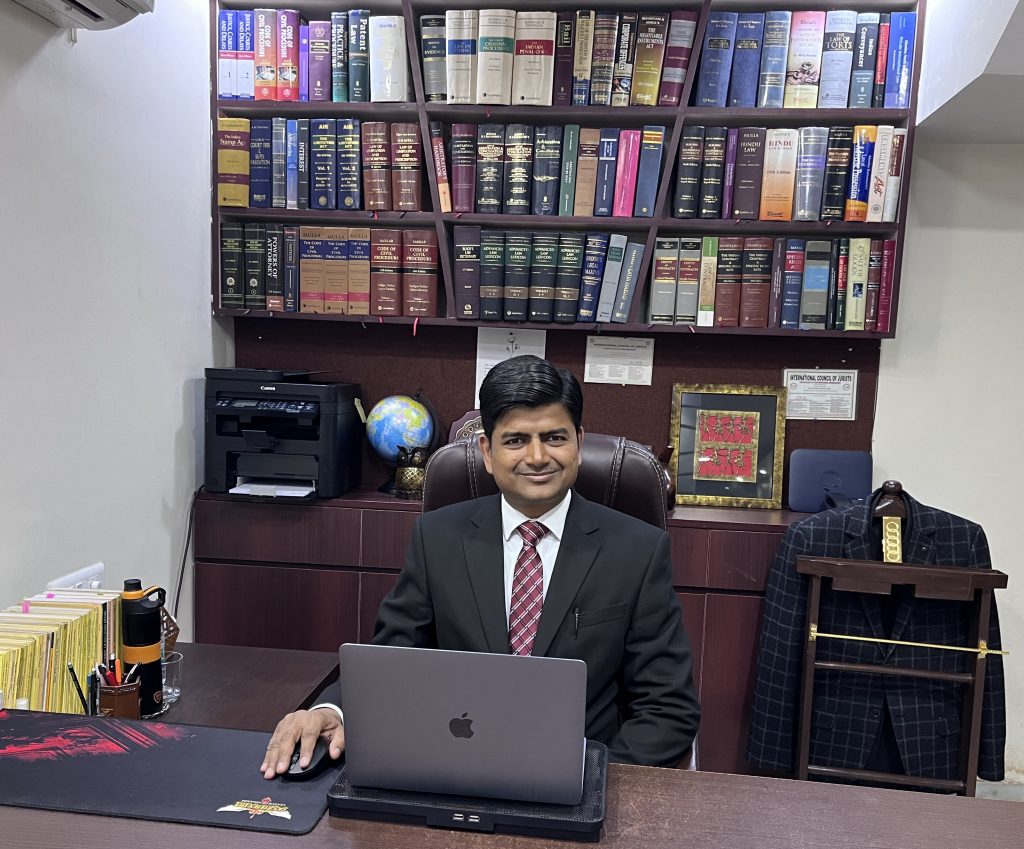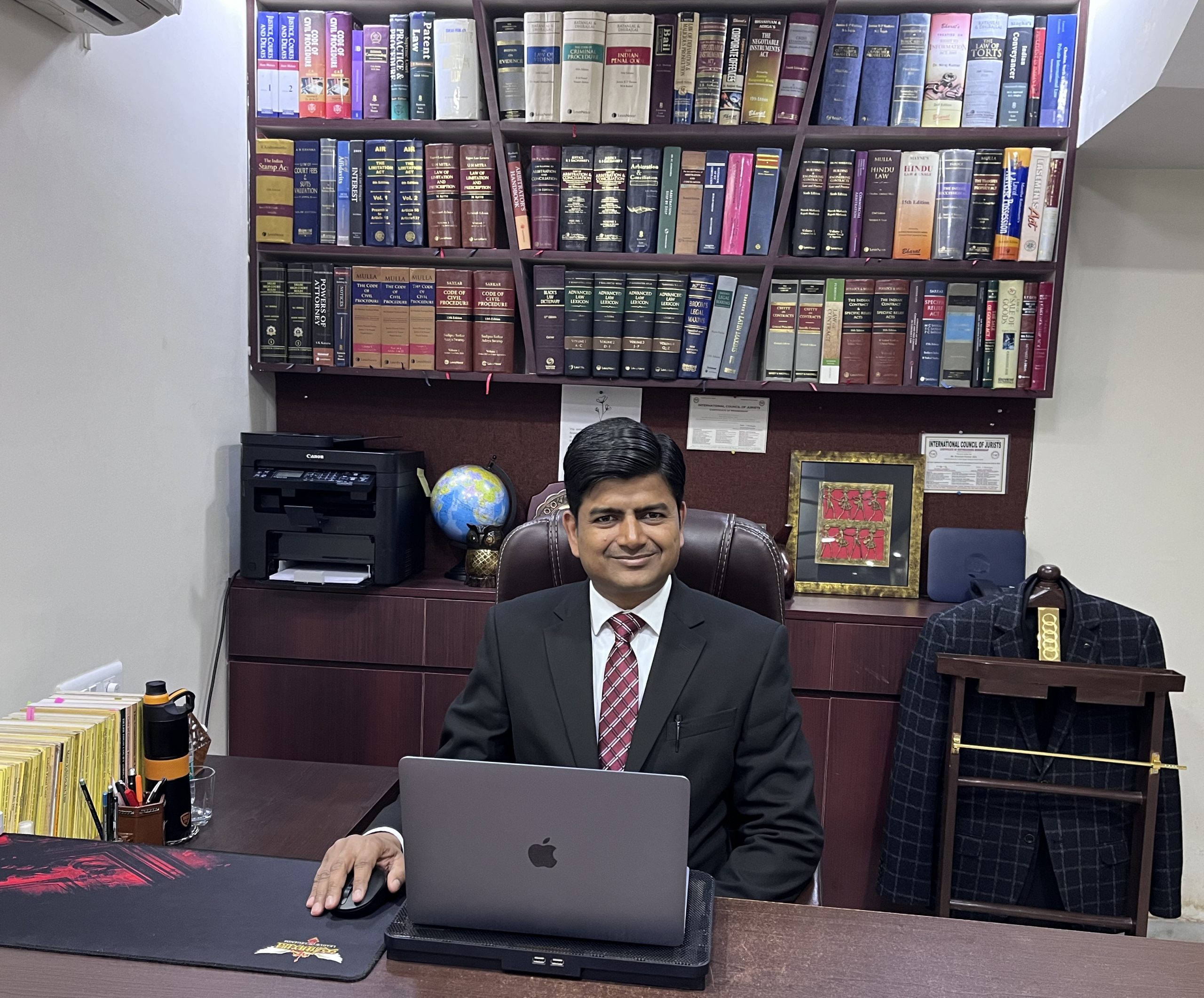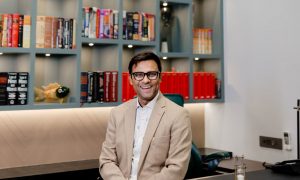This Interview has been published by Pragya Chandni and and The SuperLawyer Team

Could you please share with us how your journey into law began? What inspired you to pursue a career in the legal field?
In my hometown, lawyers were not looked at with respect due to the low fees they used to command in the twentieth century. It was believed that those who could do nothing else, do LL.B. Hence, it was not a childhood dream fascinated by observing a successful lawyer in my neighbourhood or from some scenes in Bollywood movies.
I was living in a hostel while pursuing B.Com. Simultaneously, I was doing an articleship with a CA firm namely AAG & Associates as I wanted to become a Chartered Accountant as we knew only about being doctors, engineers, and CAs at that time. In December 2000, I unearthed a financial scam in the hostel management. However, the administrators of the hostel connived with the grifter and asked me to prove the charge after forging his confession letter. That day, I argued before the influential people to prove the clerk’s wrongdoing but they let him off scot-free. That was one of the worst days of my life when I got harassed despite being a whistle-blower. The proverb “Every cloud has a silver lining” became true to me. That night while introspecting the entire incident with my younger brother Naveen, I realised I had argued very confidently and logically before so many persons in authority. I also underwent the pain of false accusations and injustice done to me. They say “जाके पांव न फटी बिवाई, वो क्या जाने पीर पराई”. I realised getting justice was one of the most basic human rights. That was the night when I decided to stand for others in their pursuit of justice.
I sought time to meet Shri Ravi Sharma, Advocate, before leaving the hostel who portrayed a very good picture of lawyers in society and advised me to do LL.B. from the University of Delhi. As luck had it, the next day one of the articles of that CA firm called me to come to Delhi as he needed someone to share room rent. I immediately came to Delhi with a small briefcase in hand and cleared the entrance test of the Faculty of Law, DU and that’s how my journey commenced in law. This has turned out to be the best decision of my life to choose law as my profession and I heartily thank God for that incident.
How did you end up specialising in arbitration and litigation?
As far as my entry into the arbitration field is concerned, it was in 2005 when I was working in Amitabha Sen & Co., we filed an application u/s 11 of the Arbitration & Conciliation Act, 1996 before the “Chief Justice of India” for appointment of the Arbitrator in an international commercial arbitration titled: Secit S.P.A. vs. NTPC. I signed that application myself without engaging an AOR and approached the Registrar (Judicial) to take it on record who asked me to file it at the filing counters. But I tried to convince him that it was to be filed before the Registrar (Judicial) only as I was not approaching the “Supreme Court of India” but the “Chief Justice of India” in his administrative capacity as per the judgement in the case of Konkan Railway Corporation Ltd. and Anr. v. Rani Construction Pvt. Ltd. (2000)2 SCC 388.
After several rounds of persuasion, the Registrar (Judicial) called me to his office and informed me that Hon’ble Mr. Justice RC Lahoti, the then Chief Justice of India, had allowed the filing of our application without engaging an AOR that too through the Registrar (Judicial) for the first time and the last time as his Lordship had directed him to amend the paragraph 10 of “The Appointment of Arbitrators by the Chief Justice of India Scheme, 1996” whereby all applications thenceforth would be filed at the filing counter of the Supreme Court only. A few months after his retirement, I joined the late Justice Lahoti’s office as his Legal Assistant. I used to assist his Lordship during arbitral hearings and in writing legal opinions by doing research and preparing drafts. Just after I commenced my independent practice in April 2008, I was engaged in an international commercial arbitration. Advocates from other states and Clients started approaching me thereafter for their arbitration cases. Several cases related to arbitration law were marked to me by the Litigation Incharge, Ministry of Law & Justice when I became Senior Panel Counsel of the Union of India in December 2014 for cases before the Hon’ble High Court of Delhi. To date, I have already argued in approx 100 cases related to arbitration law before the High Court of Delhi and approx 50 arbitration cases before the Arbitral Tribunals consisting of former Chief Justices of India, former Judges of Supreme Court & High Courts, and former officers of CPWD/ MES, etc. Today, I am handling a number of high-stakes international commercial arbitrations and construction arbitrations for several ministries of the Central Government, PSUs, autonomous bodies, and private companies. That’s how my practice heavily tilted towards arbitration law.
You had the privilege of gaining first hand training from the Late Hon’ble Mr. Justice R.C. Lahoti, Former Chief Justice of India. How did this experience shape your professional life?
I was his Lordship’s first junior post-retirement who got the privilege of getting first hand training under his tutelage. His Lordship was very humble and soft-spoken and would never admonish or scold his staff for any mistake whatsoever. His Lordship was very meticulous in doing his day-to-day personal and professional work which deeply influenced me. He was fond of exclusive stationery and the latest gadgets. He guided me to read the autobiographies of legal stalwarts, classic literature, and even stories of Singhasan Battisi, Baital Pachchisi and Panchatantra as they develop decision-making abilities and have hidden messages of imparting justice. I imbibed the habit of gifting books from his Lordship only. So far, I have gifted hundreds of books to my interns, associates, friends, and libraries. The lesson I learned from his way of working was “जिन खोजा तिन पाइया, गहरे पानी पैठ” meaning thereby the one who keeps trying deeply gets the desired results. He would always ask me to examine even the repealed Acts and overruled judgments before drafting any opinion or award to find out the reasons for the development of present-day laws. He used to discuss with an open mind and would allow me to change his drafts if gets convinced by my viewpoints. Likewise, I encourage all my associates and interns to come up with ideas that may seem even absurd to make them learn the art of thinking out of the box.
Could you share insights into the international commercial arbitration case you handled before the ICC International Court of Arbitration, France in 2008-09? What challenges did you face, and how did it contribute to your professional growth?
I started my independent practice in April 2008 and obviously did not have that much work to do. After the elevation of its counsel as a judge of the High Court of Delhi, an Indian company having business in 70 countries approached me in July 2008 for its international commercial arbitration in which the tribunal consisted of three arbitrators from different countries, the seat of arbitration was in Geneva and laws of UK/ India were applicable as per the arbitration clause. Despite my lack of experience in doing international arbitrations under the aegis of the ICC International Court of Arbitration, one of the Directors of the company who used to take a deep interest in that arbitration, entrusted the case to me. So I had to study many laws at that time including the arbitration rules of the ICC, and the laws of the UK and India. I invested in buying many latest commentaries including Chitty’s Contract, Benjamin’s Sale of Goods, Kluwer’s Yearbook Commercial Arbitration, Buhler Webster’s Handbook of ICC Arbitration, Black’s Law Dictionary, etc which were very expensive for a lawyer who had just come into independent practice. I had written an email to a legal giant of that time to give me a written opinion on a particular issue which he declined by citing the reason that giving an opinion would disable him from appearing in the matter at a later stage. I briefed 3-4 other senior advocates but somehow my client did not get enough satisfaction; hence, asked me to handle the case myself. For final arguments, my client engaged Shearman & Sterling LLP, one of the largest law firms in the USA and asked me to hand him my passport so that he could get a Visa issued to participate in the arbitral hearings in Geneva. Today I regret and laugh at the same time that I had not even heard of passports by that time. Though I immediately applied for a passport but due to no change in the schedule, my client had to leave without me. Though we lost the case, the client again approached me to draft the application u/s 34 of the A&C Act, 1996 to challenge the arbitral award. This case considerably enhanced my interest, experience and confidence in international commercial arbitrations and gave me the opportunities to read laws of different jurisdictions and to brief several senior advocates which helped me in my ensuing practice. No doubt I earned handsome fees which enabled me to get established during those initial times. Of the above incident, I wish to convey to the fresh graduates that you should always be positive and hopeful as God has its mechanism to help you through unexpected ways.
Your profile mentions the publication of several critical articles and the delivery of speeches/ lectures to law students and professionals. How do you balance your practical legal work with academic pursuits, and how has this dual engagement enriched your legal practice?
Mr. Vinay Vaish, Managing Partner of Vaish Associates, encouraged me to write my first article titled: Should Capital Punishment Be Given Capital Punishment – A Capital Question” while I was interning in his law firm in June 2004. That article was published in Delhi Law Review – the annual journal of the Faculty of Law, University of Delhi. Thereafter, I wrote many articles that were published in the journals of NLU Jodhpur, Indian Law Institute, the Institute of Company Secretaries of India, Indian Social Institute, CNN magazine, etc. By writing articles, you not only learn to identify the legal issues but also how to do multidimensional research and develop your arguments; particularly when you seek to differ with a judgement of the Supreme Court/ High Court. Further, I have never declined invitations to deliver speeches and lectures to law students and professionals. The latest one was in December 2023 to the serving officers of Military Engineer Services, Ministry of Defence. I have also delivered lectures to 4th year students at a law school in Delhi as a guest faculty during my early days of practice.
There is no dual engagement and nothing to be balanced to write legal articles. I identify the conflicting issues while researching to argue in my forthcoming cases and shape them into articles/ case comments. I feel grateful to the late Hon’ble Mr. Justice RC Lahoti, Mr. Jagdish Sagar, Advocate, and Professor Alka Chawla, PIC of Campus Law Centre, for vetting my all articles with keen interest by taking time out of their busy schedules.
Due to publications, I have got many new clients who read my articles and approached me for their cases. One army man from Kolkata came to my chambers to engage me for his brother-in-law’s case as he believed that an advocate who dares to author and publish articles critical of the Supreme Court’s judgement would be dead honest. Senior Vice President of a pharmaceutical company came down from Bangalore to engage me in his several cases after reading one of my articles. During those days, law students from NLUs approached me to intern in my office after reading my articles as there were no online platforms at that time. I also got appreciation from my peers, seniors, and judges.
You’ve been representing various government departments, PSUs, and autonomous bodies since 2014. Could you share some highlights or challenges faced while representing them before the Delhi High Court and Arbitral Tribunals?
Representing the Central Government for me is a matter of gratification and a sense of fulfilment as well. Being the government’s counsel, you are expected to be thoroughly prepared and more responsible than the opposite party in your conduct before the court. You are appointed in cases of a wide range and having issues of national importance which is an exceptional opportunity to learn and get noticed by the judges and others present in the courtroom. Further, you get a close opportunity to learn how the government functions. I might have never appreciated how much effort the government officers make with utmost honesty and sincerity to safeguard the public money had I not been engaged by different government organisations in the last 9-10 years. However, there are certain practical and common challenges that I encounter while representing the government:
- There is no monetary reward for winning the cases for the government. You need to have a strong purpose and abundant willpower that will propel you to keep burning your midnight oil.
- Sometimes, you don’t get proper and timely instructions due to frequent transfers of the concerned officers or their heavy workload.
- Difficult to find the concerned officers of different ministries as sometimes the cases get marked in late evening and you have to appear before the High Court the next morning when the opposite party might be seeking some urgent relief.
- Very low fee irrespective of your standing at the Bar and the nature of cases which makes it difficult to run the office. No clerkage is paid even though you have to file ten thousand pages of documents with applications u/s 34 of the A&C Act, 1996. Payment of bills gets delayed routinely.
- Had a good private practice; particularly, before the Supreme Court, prior to getting panels, which suffered due to heavy workload before the High Court of Delhi and arbitral tribunals. I couldn’t appear before other High Courts also which I used to do earlier.
Your focus has been on defending various ministries of the Government of India in construction and engineering arbitration cases. What complexities do these cases typically involve, and how do you navigate them successfully?
Construction law is a specialised field that has its highs and hindrances. Site managers who get the work executed are not available for briefing due to transfers or retirements, and documents related to the site like works diary, site order book, cement register, steel register, test register, drawings, etc are not made available due to non-maintainability of the record properly or lack of coordination between the headquarter and the site offices. Officers briefing me and sending comments to draft pleadings have generally not visited the site. Lack of trained and separate staff leads to delayed drafting and filing which sometimes results in imposition of costs or closure of the right to place on record the pleadings. A few arbitrators held hearings at venues out of Delhi where we could not go due to the lack of provision to reimburse the actual expenses. Some of the officers are unwilling to appear as a witness as they apprehend that in case their answers turn out to be favourable to the claimant, that may land them in the soup or they may be exposed to their inadequate knowledge. There is an acute deficiency of supporting staff and logistics required for efficient conduct of arbitral hearings. Officers as well as I are overburdened which makes us have late-night conferences in the office almost every day to prepare for the arguments the next day. The claimants engage a team of lawyers led by seniors, whereas the government does not have provision for paying a minimal fee to even a single associate of its counsel.
Further, a few of the sole arbitrators consisting of former judges may not have that much sound technical knowledge while the sole arbitrator being an engineer may not be able to appreciate the basic concept of ‘burden of proof’ and generally get completely baffled by the judicial precedents as to which one to be followed. Having a tribunal consisting of three arbitrators makes it unaffordable and the proceedings get delayed due to the non-availability of matching dates.
To encounter some of the above difficulties, I deploy my additional staff and I have also visited a few project sites to learn the quality and status of the executed works. I insist on the presence of project managers and site staff who have contemporaneous personal knowledge. Despite so many challenges, we have finished final arguments in more than 12 big construction arbitrations in 2023 out of which 8 awards have been published. All the cases filed by the contractors have either been dismissed, including two wherein our statement of defence not taken on record, or a small percentage of the claimed amount has been allowed. In one case, we have just been awarded 35 crores for counterclaims by a former judge of the Supreme Court. Such successes and genuine appreciation from the court/ tribunal alleviate all hurdles and make you stride with added vigour.
You’ve consistently pursued professional development, including obtaining a PG Diploma in ADR and currently pursuing an LL.M. in ADR. How do you believe these additional qualifications enhance your capabilities as a legal professional?
I firmly believe in continuous education in the form of participating in conferences, writing articles, and enrolling in specialised professional courses in which you are practising or intend to practise. I was greatly influenced by the fact that my mentor Justice Lahoti was looking for a tutor to learn Sanskrit language to read the untranslated literature in its original form just after his retirement, showing that age is just a number. Undoubtedly, doing an LLM/ PhD is not the recipe for becoming a good advocate but may help you learn the art of doing in-depth legal research, develop the habit of reading law books for long hours, explore the law library, learn the art of legal writing in the form of research articles and projects, if you have not done all the above in your law school due to the factors of you being in part employment or for lack of guidance, etc at that time. However, you would get to learn theoretical aspects of law and may make new lifelong friends and professional connections in the classroom. Further, additional diplomas and degrees in the same field you are practising in give a little extra credibility to your profile. Moreover, I have seen some government organisations and arbitration centres give added weightage at the time of empanelment if you have done LL.M.
Further, my father, who has earned three master degrees, always encourages us to go for higher studies by saying that no degree remains irrelevant and it may come to your aid in future. One of the reasons for attending the classes is that Generation Z keeps me updated with the technology and young at heart.
Lastly, considering your extensive experience and varied roles, what advice would you like to give to law students or fresh graduates who are just starting their legal careers, especially those interested in arbitration and litigation?
Ours is such a wonderful profession where all lawyers help each other without having any kind of competition or jealousy. You ask a query in any lawyers’ WhatsApp group and solutions will start pouring in. I would advise fresh graduates to not gripe about being first-generation lawyers or from small towns or being Hindi medium/ non-NLU students – “Count your blessings, name them one by one; Count your blessings, see what God hath done”. After coming into independent practice, I surprisingly realised that grey hair or lineage no longer convinces a client of you being a competent lawyer.
Never believe in the cries of nepotism and favouritism. Had it been so, I would not have won so many cases against eminent senior advocates and big law firms. The first case I won before the Supreme Court was where Ld. ASG was appearing for UOI and the recent one is against a senior known for his international arbitration practice. No judge has snubbed me for coming from a humble background. Please understand that every profession has its incomparable gestation period. For establishing in litigation you may have to ‘live like a hermit, work like a horse’ during the initial years.
Always be grateful to society for giving us affordable education – Most of us have got education in government schools and colleges at a negligible fee.
“Stay hungry, stay foolish” is perhaps the most apt quote for Advocates. Keep reading the A&C Act, Contract Act, Specific Relief Act, Partnership Act, Sale of Goods Act, Limitation Act, CPC, Suit Valuation Act, Stamp Duty Act, Registration Act, Bhartiya Sakshya Adhiniyam and General Clauses Act while waiting for your turn in the courts as many cases get dismissed for the technicalities prescribed in the above Acts.
Pay special attention to the art of cross-examination, which is done by your seniors and even by other advocates – with this skill alone you can batten down the hatches.
Finally, love your profession, it loves you back. Be proud of being an advocate – you are on an eternal quest of securing justice for the helpless and hapless people – sometimes the animals and nature even. God is always with you!
The following aspects greatly contributed to the growth of my practice:
- One should undergo training for at least 5-6 years before establishing own chamber.
- Invest in buying good commentaries and study the relevant provisions before doing any drafting or making arguments in the court.
- As a matter of lifestyle make life-long relationships with your clients, classmates, and opposite counsel who often refer clients to you.
- Write articles; particularly, for legal news & views websites and professional bodies like Chartered Accountants and Company Secretaries.
- Read autobiographies of legal stalwarts and interviews on websites like www.superlawyer.in
- Don’t waste your time in cafeteria gossip, at least during the initial years.
- Try to grab the opportunities to argue the cases of your seniors. Most of the judges do not pass adverse orders if you fumble but they expect and appreciate good preparation at your end.
- Do the same level of work for a fee of rupees one thousand as you would do for a fee of rupees one lakh – this will raise your default standards of working.
- It is such a fast-paced profession that if you don’t realise you knew nothing 6 months back then you have wasted your last 6 months. Keep upgrading your skills by adopting technology, attending conferences, and doing specialised courses.
- Honesty and Integrity will grow your practice like bamboo after 8-10 years.
- It is not your last day in the court, it is not your last case – do your best and leave it to the fate of the client. Don’t get tempted to take a shorter route – it leads nowhere.
- Have good terms with your seniors who may refer some cases to you when you leave their chambers. Mr. Vaish and the late Justice Lahoti have referred a few good cases to me.
- Develop the habit of reading literature. Late Justice Lahoti used to emphasise upon reading books every day. Many times, I have referred to incidents from Ramayana, Mahabharata, Bhagawad Gita and stories of Munshi Premchand/ Ravindra Nath Tagore and recited Dohe & Sher to cut across my viewpoints which significantly impacted the judges/ arbitrators. I listen to classics on Audible these days.
- Last but not the least, पहला सुख निरोगी काया. Please take care of your health to be in this unending marathon.
Get in touch with Praveen Kumar Jain-
























